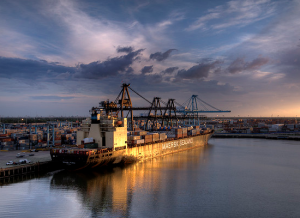American Shipping Law Raises Prices for Consumers
< < Go Back
A largely unknown federal statute requires that all goods being shipped by water between American ports must be transported on American-made and American-owned ships that have American crews. Why do we even have such a law? Jared Meyer of Economics21 says it originated in 1920, when a senator from Washington wanted to ensure that his state’s ships would be used to transport goods to Alaska. Today, the law still has strong support from coastal states and unions.
What does the Jones Act mean for consumers? Nothing good, says Meyer — because the law reduces competition, it raises costs on consumers who are forced to pay higher prices. He also notes that the law has kept much-needed goods out of states; when New Jersey ran out of road salt last winter, a foreign-owned vessel was available to bring the salt to the state, but it was stopped by federal officials due to the Jones Act, and New Jersey never received the shipment. Similarly, foreign ships were available to assist in the Deepwater Horizon oil spill in 2010, but the Jones Act prevented them from aiding in the cleanup efforts.
Without competition from foreign shippers, American companies have less incentive to innovate, and high American shipping costs can deter business deals. Meyer notes that 80 percent of the difference between American and foreign ships is due to the cost of the American crew, whose expenses tend to be 4.5 times more than crew expenses on foreign ships.
The Houston Chronicle reports that foreign ships can transport crude oil from the Gulf to Canada for $2 per barrel, while it costs America’s Jones Act-compliant ships $5 to $6 per barrel to take crude oil from the Gulf to America’s Northeast.
More From NCPA:




